Is your website Mobile friendly?
How Google ranks your website -- SEO (Search Engine Optimsation
On Tuesday (21 April), Google’s rules will change for how they rank websites. Google will be taking note of how well websites can be viewed on mobile devices. SEO (Search Engine Optimisation or how websites rank in Google) is a hugely complex beast within the topic of online marketing. And, consequently, SEO marketing agencies are the best, and worst, at taking advantage of small businesses who “don’t know what they don’t know”. So, let’s get you “knowing” some of the basic SEO stuff so you don’t feel overwhelmed and can work out what you can do versus what you may need to outsource. And I'll explain the latest Google change. Grab a tea or coffee or hot chocolate as it's a long one. You may find it easier to print off and go through bit by bit.
How does Google rank websites?
I love Jim Stewart, Stewart Media, a helpful SEO guru and recommend you subscribe to his weekly videos. He has answered this question in the plainest language I have heard, which is: Google has a reputation of helping people find what they are looking for on the internet. They want to deliver quality results for whatever words you enter into their search engine. So, Google has pre-determined some factors that they believe help them bring the “best” and “most appropriate” websites links to their users.
What are the pre-determined factors for SEO success?
I am no SEO marketing expert and am always upfront about this. But, I also have a website that ranks really well, including ‘Page 1’ for 'Marketing Consultant Melbourne'. I have never outsourced my SEO believing I can manage the following: 1. Have a user friendly website that works.The first thing any reputable SEO business will do to help you rank (better) in Google is to review your website and make sure it works, is quick to download and has no mistakes. Some issues to look out for includes pages with Error 404 message (i.e. the page link is broken), duplicated content and that Google's robots detect your website pages without issue. 2. Have content that clearly explains what you do and helps your visitors. 3. Regularly update content by writing blogs within the area/industry you want to be found online. 4. Have back-links (inbound links) from quality website that you have NOT paid for.Inbound links is something I wrote about some time back for a client’s website (read article), but, in essence, it is having other websites link to your website. So it may be you’ve written an article that is published on another site, it may be an online directory (free or that you pay membership for), your business’ social media pages are “back-links”.Google assumes that if other websites are linking back to yours then it (and you) must be quality and need to be found by its searchers.SEO companies used to take advantage of this and buy links for their clients from websites from all over the world, unrelated to your industry. Google cottoned onto this and now punishes any website caught using this tactic, so don’t risk this tactic for short-term glory. 5. Use key words (that you want to be found for) within your website's Headers, Page Title, Meta Tags and Meta Description OK, this gets more technical, but if you have a good CMS – Content Management System or the backend of your website – that you manage and update, you will most likely be able to do this yourself too. Look for "SEO Tools" within your CMS. 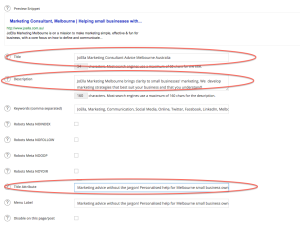 This is an example of the SEO Tool sections I use on each page (and blog) within my WordPress website
This is an example of the SEO Tool sections I use on each page (and blog) within my WordPress website 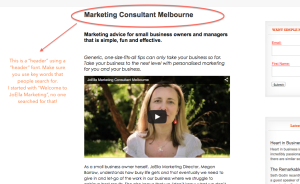 This is an example of an SEO friendly page "Header", with keywords I want to be found for. 6. Have a website that attracts visitorsThis is a little Catch 22 and was not something I realised affected Google rankings, but it can. How do you get visitors? Write good content that people want to read, content they will be looking for, articles on questions people are asking, content people want to share to draw other people to your site.It takes time. But stick with it.
This is an example of an SEO friendly page "Header", with keywords I want to be found for. 6. Have a website that attracts visitorsThis is a little Catch 22 and was not something I realised affected Google rankings, but it can. How do you get visitors? Write good content that people want to read, content they will be looking for, articles on questions people are asking, content people want to share to draw other people to your site.It takes time. But stick with it.
7. Have a mobile friendly website
This is the latest update to Google’s checklist that I will talk about further below. Plus... lots of other little tricks and tools to look out for, including setting up your website to Google Webmaster and analysing visitors and their behaviour on Google Analytics. Which all gets a little too technical to write about here but something I can certainly talk to you about.
Exhausted yet? Bear with me as I detail some other helpful SEO tips.
How do you get on Page 1 of Google?
Very good question! Often asked question. Difficult to answer! If you tick off the checklist above, you will have a good chance of increasing your Google result. But how well you rank is dependent on how well your competitors are doing online. Jim Stewart gave another pearl of wisdom recently saying your SEO is not competing against Google, it is competing against the website ranked No 1 on Page No 1 for the words you want to be found for. So, if you’re in a highly competitive industry, you will need to work extra hard to be deemed better than what Google regards as its (currently ranked) top websites for its visitors. You will need hard work, creative thinking and some marketing tactics outside of SEO to push people to your website.
Should I pay to outsource my SEO?
This really depends on your marketing budget, how quickly you want to see results, the competition within your industry and if you are able to implement the above-mentioned tactics yourself. Also remember, when determining your marketing spend, SEO is just one marketing element. An SEO specialist will only work on this. This may be what you want, or you may decide you want a more generalist marketer. Either way, make sure you ask the above questions to ascertain their SEO knowledge. And knowing all the permutations to SEO success, be wary of any business that guarantees results. They can’t!
Should I pay for keywords -- Google Adwords?
Another question that depends on your marketing spend budget. For those not 100% clear, there is organic and paid Google rankings. Paid SEO rankings is paying Google money for key words to then advertise when someone searches for those words. This is Google AdWords and they appear at the very top and right-hand side of Google. Organic SEO are the results that appear that are not paid to appear there. 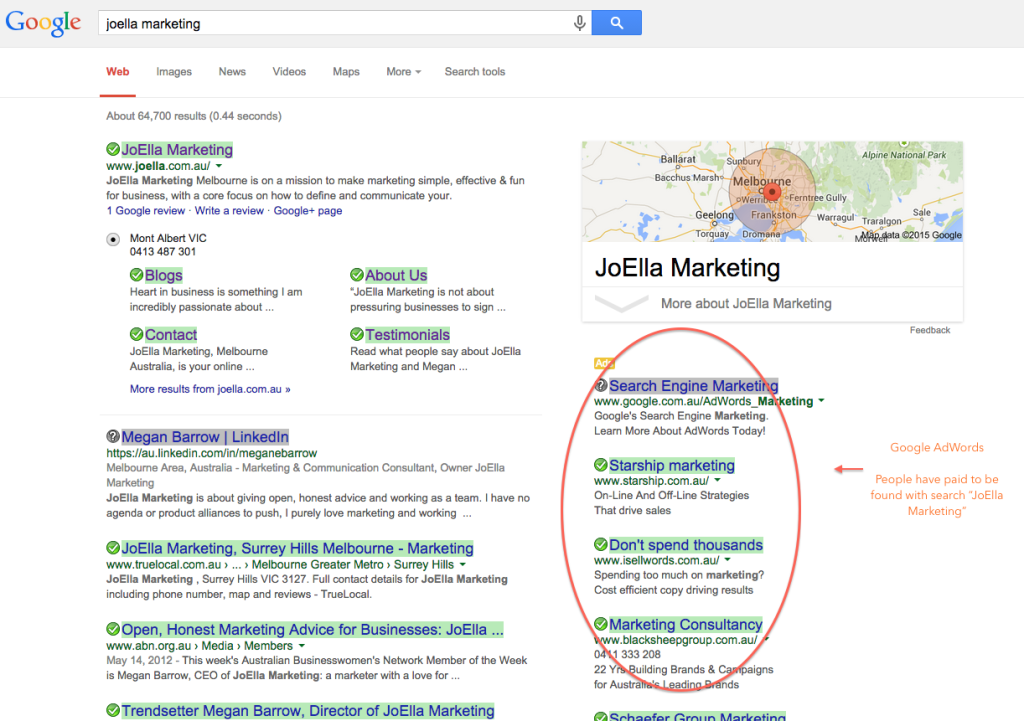 Strange people are paying Google AdWords to be found for JoElla Marketing, but I'm flattered! One thing to also consider with Google AdWords is success will be determined by competition. When 100s of businesses are all paying for Google to advertise their chosen keywords, the price goes up for these words and you cannot be guaranteed of appearing on Page 1. But Google AdWords can be a brilliant tactic to introduce a new business/website to the marketplace and to be found more easily and quickly. If you want advice on AdWords, please check out Mel Samson – a total gun and my go-to AdWords person. She also has great newsletters packed with helpful information.
Strange people are paying Google AdWords to be found for JoElla Marketing, but I'm flattered! One thing to also consider with Google AdWords is success will be determined by competition. When 100s of businesses are all paying for Google to advertise their chosen keywords, the price goes up for these words and you cannot be guaranteed of appearing on Page 1. But Google AdWords can be a brilliant tactic to introduce a new business/website to the marketplace and to be found more easily and quickly. If you want advice on AdWords, please check out Mel Samson – a total gun and my go-to AdWords person. She also has great newsletters packed with helpful information.
What is the latest Google change for SEO?
As mentioned above, Google has now deemed websites that can be viewed on mobiles as one of their factors for a good website. And it makes sense with so many people searching online while on-the-road and on their mobiles – people no longer wait to get to a desk top computer. While making sense, it has put a lot of business owners on-the-hop, including me! That precious ranking I mentioned earlier for JoElla Marketing may have been at risk if I didn’t fix my website to be mobile friendly. This change will most affect websites whose industry has a large proportion of users searching on mobiles. For example, restaurants, retail, etc. I discovered my website only has a small percentage of visitors via mobiles – which Mel Samson helped me with understanding via this video tutorial (told you she’s a gun!) -- but didn't want to risk the Google freight train.
What is a Mobile website vs Responsive website?
A mobile website is one that has a different design to your desktop version, specifically designed to be viewed on a mobile device.  This is how my JoElla Marketing website now looks on mobile devices. It's a mobile website that is different to my desktop version. A responsive website is a website design that looks the same on desktop and mobile and changes it’s design according to the device. You can easily tell a responsive website because on a desktop you can watch the design change if you make your screen smaller/bigger – the design seamlessly adjusts to the size.
This is how my JoElla Marketing website now looks on mobile devices. It's a mobile website that is different to my desktop version. A responsive website is a website design that looks the same on desktop and mobile and changes it’s design according to the device. You can easily tell a responsive website because on a desktop you can watch the design change if you make your screen smaller/bigger – the design seamlessly adjusts to the size. 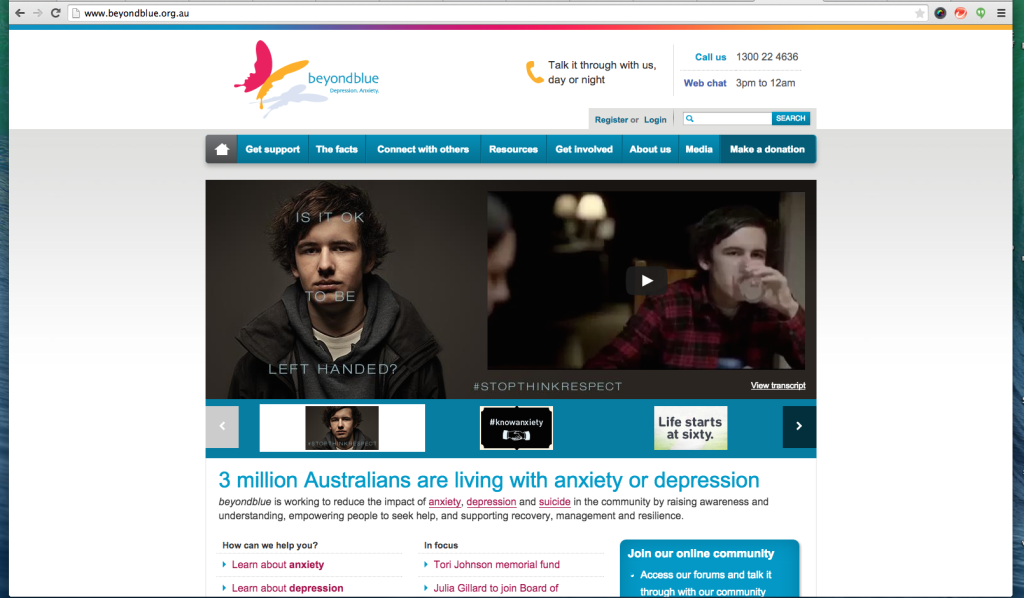 This is beyondblue's website when opened on desktop
This is beyondblue's website when opened on desktop  But when you drag the screen size to make smaller its design changes. This is responsive.
But when you drag the screen size to make smaller its design changes. This is responsive. 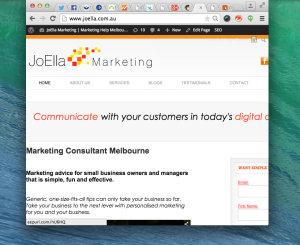 Whereas, my JoElla website doesn't change design if screen is dragged in smaller, so it has not been designed as a responsive website.
Whereas, my JoElla website doesn't change design if screen is dragged in smaller, so it has not been designed as a responsive website.
How do you know if your website is mobile friendly?
Check it out on a mobile/smartphone! Also check how Google rates your website’s mobile friendliness here https://www.google.com/webmasters/tools/mobile-friendly/.
What do you do if your website is not mobile ready for Google?
This is where I was last weekend. I knew it was all coming but had to take a moment to work it all out. Google does have some great information that helped me. Check out their help site here. Luckily I have a WordPress website and was quickly guided me to install a “Plugin”. It was super easy to do and after a few adjustments I had a live mobile version of my website (per above image). I know it’s not perfect. A website developer would have done something “prettier”. But it was free and Google now gives my site the tick so will continue to rank it favourably. If your website is not mobile friendly and you’re not sure what to do, have a chat with your website developer. But, if you don't have a developer and feel stuck, drop me a line and either I may be able to help or suggest a few names that will help. I hope this information been helpful. I know it’s been a long one, but it’s a big topic! Let me know your thoughts and how you manage your SEO. And if you have any questions, again, flick me a note and we can have a chat
